Analyzing Information Overload's Effects on Mass Communication
VerifiedAdded on 2022/08/21
|9
|2372
|20
Essay
AI Summary
This essay delves into the critical issue of information overload within the realm of mass communication. It begins by defining the concept and tracing its historical roots, highlighting the impact of the information age and the proliferation of digital media. The essay explores how social media, web pages, and other sources contribute to the daily inundation of information, leading to challenges in understanding and processing data. It examines the role of news media, the rise of manipulative platforms, and the spread of fake news. The essay analyzes the cognitive impacts of information overload, referencing scholars like Nicholas Carr and discussing the varying perspectives on the effects of internet use on human intelligence. It then explores various causes of information overload, including the exponential growth of data, pressure to compete, and the ease of information sharing. The essay discusses the consequences of information overload, such as confusion, the spread of misinformation, stress, and reduced productivity. Finally, it offers potential solutions for individuals to manage information overload, including the importance of critical thinking, skimming, and recognizing the societal and personal consequences of information overload.
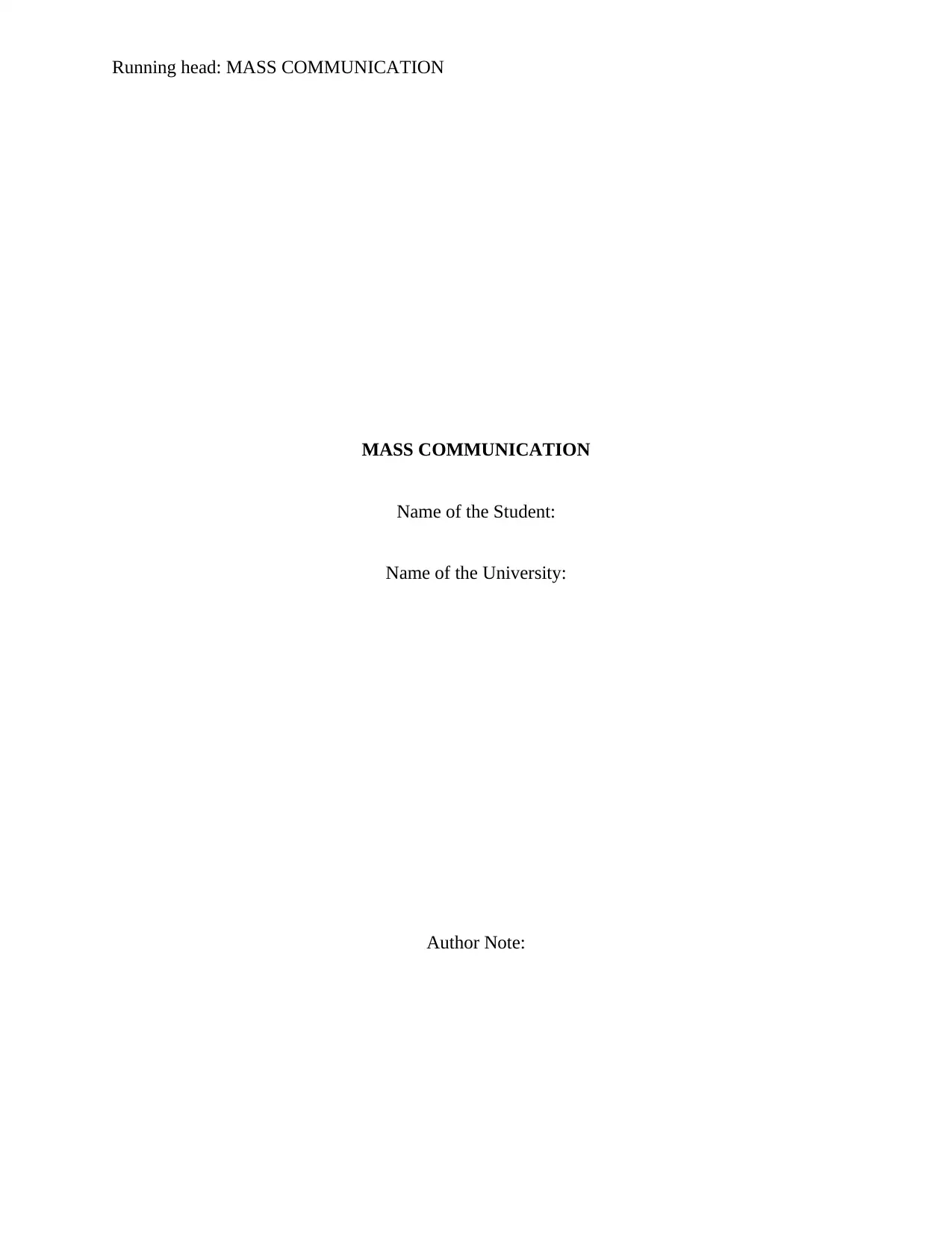
Running head: MASS COMMUNICATION
MASS COMMUNICATION
Name of the Student:
Name of the University:
Author Note:
MASS COMMUNICATION
Name of the Student:
Name of the University:
Author Note:
Paraphrase This Document
Need a fresh take? Get an instant paraphrase of this document with our AI Paraphraser
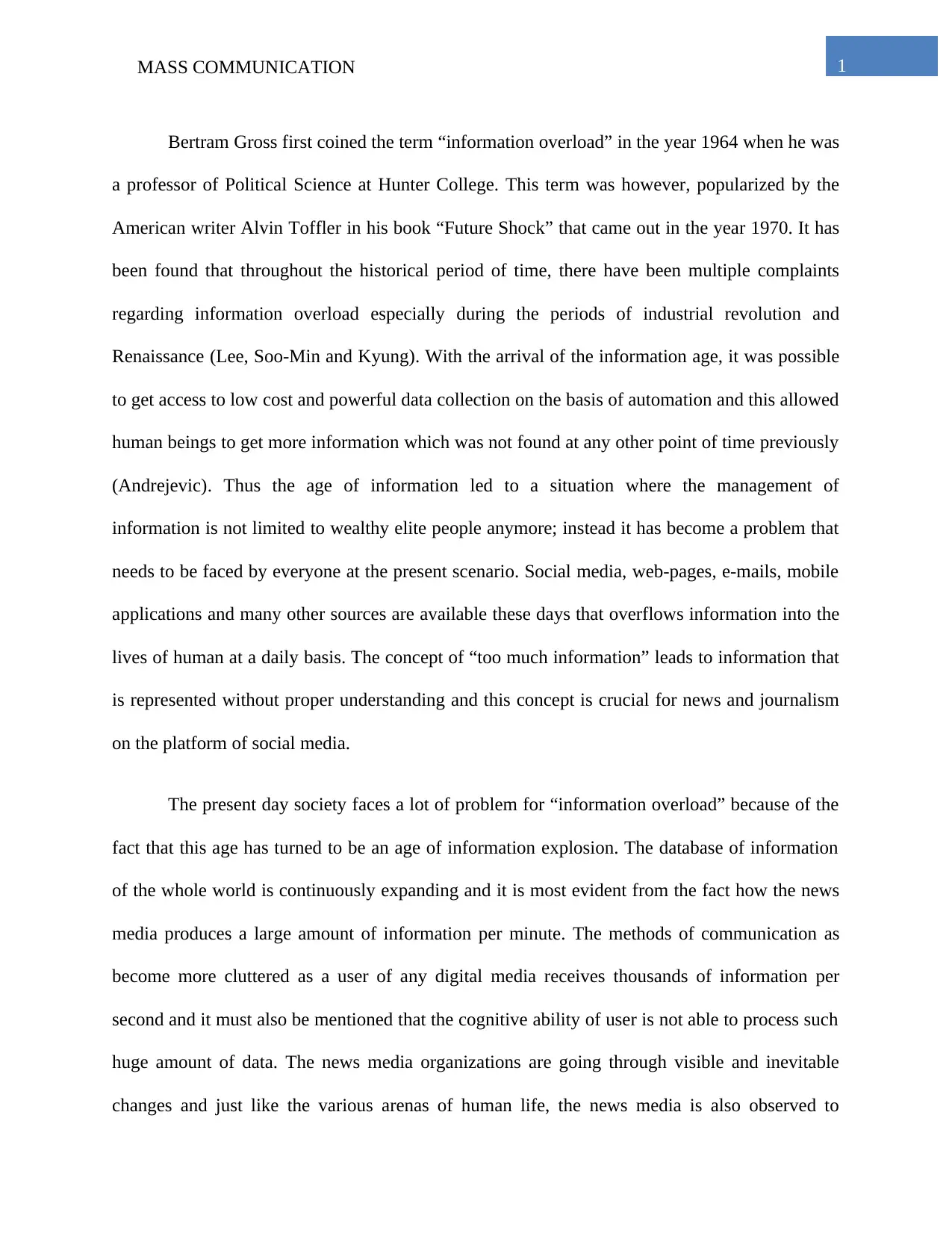
1MASS COMMUNICATION
Bertram Gross first coined the term “information overload” in the year 1964 when he was
a professor of Political Science at Hunter College. This term was however, popularized by the
American writer Alvin Toffler in his book “Future Shock” that came out in the year 1970. It has
been found that throughout the historical period of time, there have been multiple complaints
regarding information overload especially during the periods of industrial revolution and
Renaissance (Lee, Soo-Min and Kyung). With the arrival of the information age, it was possible
to get access to low cost and powerful data collection on the basis of automation and this allowed
human beings to get more information which was not found at any other point of time previously
(Andrejevic). Thus the age of information led to a situation where the management of
information is not limited to wealthy elite people anymore; instead it has become a problem that
needs to be faced by everyone at the present scenario. Social media, web-pages, e-mails, mobile
applications and many other sources are available these days that overflows information into the
lives of human at a daily basis. The concept of “too much information” leads to information that
is represented without proper understanding and this concept is crucial for news and journalism
on the platform of social media.
The present day society faces a lot of problem for “information overload” because of the
fact that this age has turned to be an age of information explosion. The database of information
of the whole world is continuously expanding and it is most evident from the fact how the news
media produces a large amount of information per minute. The methods of communication as
become more cluttered as a user of any digital media receives thousands of information per
second and it must also be mentioned that the cognitive ability of user is not able to process such
huge amount of data. The news media organizations are going through visible and inevitable
changes and just like the various arenas of human life, the news media is also observed to
Bertram Gross first coined the term “information overload” in the year 1964 when he was
a professor of Political Science at Hunter College. This term was however, popularized by the
American writer Alvin Toffler in his book “Future Shock” that came out in the year 1970. It has
been found that throughout the historical period of time, there have been multiple complaints
regarding information overload especially during the periods of industrial revolution and
Renaissance (Lee, Soo-Min and Kyung). With the arrival of the information age, it was possible
to get access to low cost and powerful data collection on the basis of automation and this allowed
human beings to get more information which was not found at any other point of time previously
(Andrejevic). Thus the age of information led to a situation where the management of
information is not limited to wealthy elite people anymore; instead it has become a problem that
needs to be faced by everyone at the present scenario. Social media, web-pages, e-mails, mobile
applications and many other sources are available these days that overflows information into the
lives of human at a daily basis. The concept of “too much information” leads to information that
is represented without proper understanding and this concept is crucial for news and journalism
on the platform of social media.
The present day society faces a lot of problem for “information overload” because of the
fact that this age has turned to be an age of information explosion. The database of information
of the whole world is continuously expanding and it is most evident from the fact how the news
media produces a large amount of information per minute. The methods of communication as
become more cluttered as a user of any digital media receives thousands of information per
second and it must also be mentioned that the cognitive ability of user is not able to process such
huge amount of data. The news media organizations are going through visible and inevitable
changes and just like the various arenas of human life, the news media is also observed to
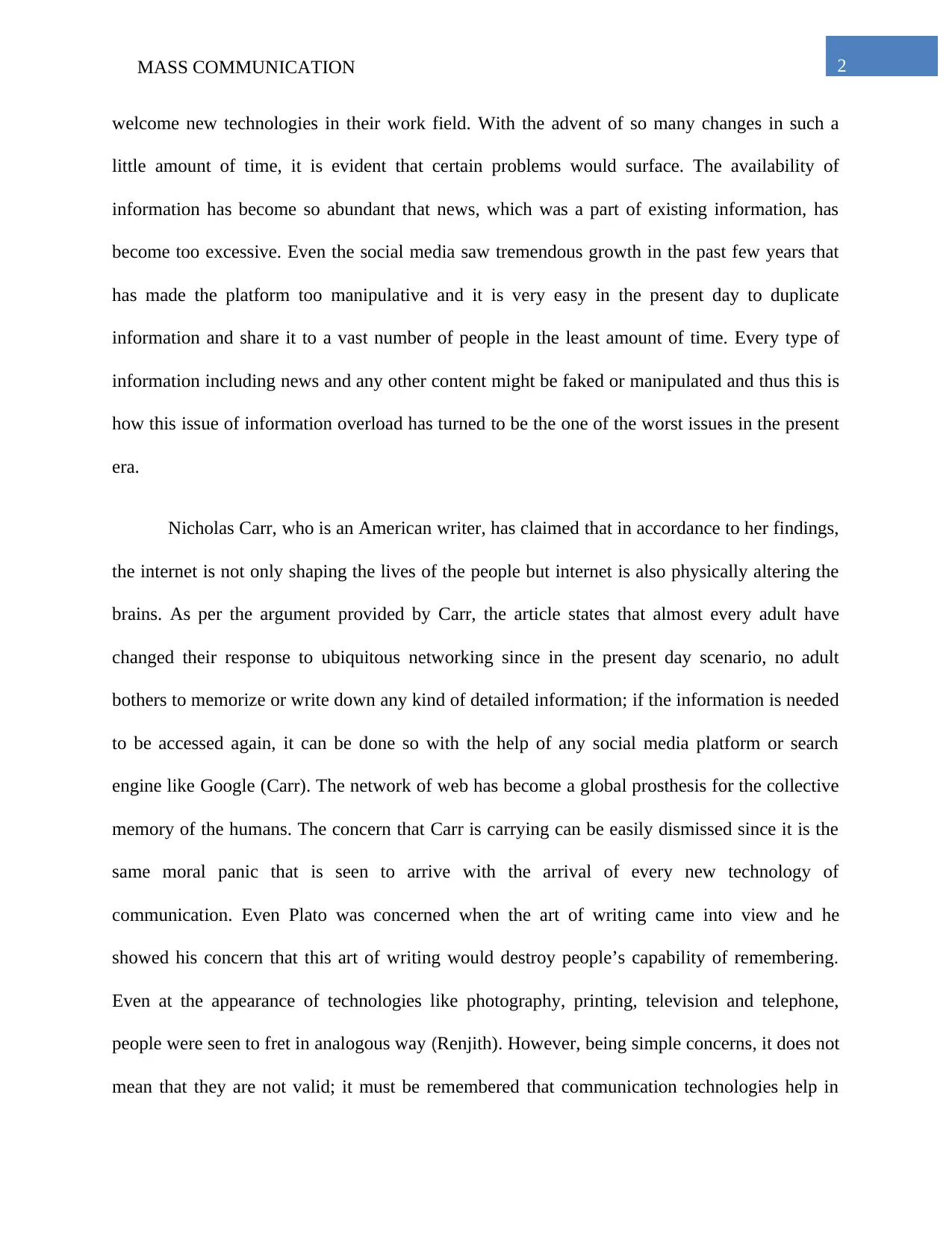
2MASS COMMUNICATION
welcome new technologies in their work field. With the advent of so many changes in such a
little amount of time, it is evident that certain problems would surface. The availability of
information has become so abundant that news, which was a part of existing information, has
become too excessive. Even the social media saw tremendous growth in the past few years that
has made the platform too manipulative and it is very easy in the present day to duplicate
information and share it to a vast number of people in the least amount of time. Every type of
information including news and any other content might be faked or manipulated and thus this is
how this issue of information overload has turned to be the one of the worst issues in the present
era.
Nicholas Carr, who is an American writer, has claimed that in accordance to her findings,
the internet is not only shaping the lives of the people but internet is also physically altering the
brains. As per the argument provided by Carr, the article states that almost every adult have
changed their response to ubiquitous networking since in the present day scenario, no adult
bothers to memorize or write down any kind of detailed information; if the information is needed
to be accessed again, it can be done so with the help of any social media platform or search
engine like Google (Carr). The network of web has become a global prosthesis for the collective
memory of the humans. The concern that Carr is carrying can be easily dismissed since it is the
same moral panic that is seen to arrive with the arrival of every new technology of
communication. Even Plato was concerned when the art of writing came into view and he
showed his concern that this art of writing would destroy people’s capability of remembering.
Even at the appearance of technologies like photography, printing, television and telephone,
people were seen to fret in analogous way (Renjith). However, being simple concerns, it does not
mean that they are not valid; it must be remembered that communication technologies help in
welcome new technologies in their work field. With the advent of so many changes in such a
little amount of time, it is evident that certain problems would surface. The availability of
information has become so abundant that news, which was a part of existing information, has
become too excessive. Even the social media saw tremendous growth in the past few years that
has made the platform too manipulative and it is very easy in the present day to duplicate
information and share it to a vast number of people in the least amount of time. Every type of
information including news and any other content might be faked or manipulated and thus this is
how this issue of information overload has turned to be the one of the worst issues in the present
era.
Nicholas Carr, who is an American writer, has claimed that in accordance to her findings,
the internet is not only shaping the lives of the people but internet is also physically altering the
brains. As per the argument provided by Carr, the article states that almost every adult have
changed their response to ubiquitous networking since in the present day scenario, no adult
bothers to memorize or write down any kind of detailed information; if the information is needed
to be accessed again, it can be done so with the help of any social media platform or search
engine like Google (Carr). The network of web has become a global prosthesis for the collective
memory of the humans. The concern that Carr is carrying can be easily dismissed since it is the
same moral panic that is seen to arrive with the arrival of every new technology of
communication. Even Plato was concerned when the art of writing came into view and he
showed his concern that this art of writing would destroy people’s capability of remembering.
Even at the appearance of technologies like photography, printing, television and telephone,
people were seen to fret in analogous way (Renjith). However, being simple concerns, it does not
mean that they are not valid; it must be remembered that communication technologies help in
⊘ This is a preview!⊘
Do you want full access?
Subscribe today to unlock all pages.

Trusted by 1+ million students worldwide
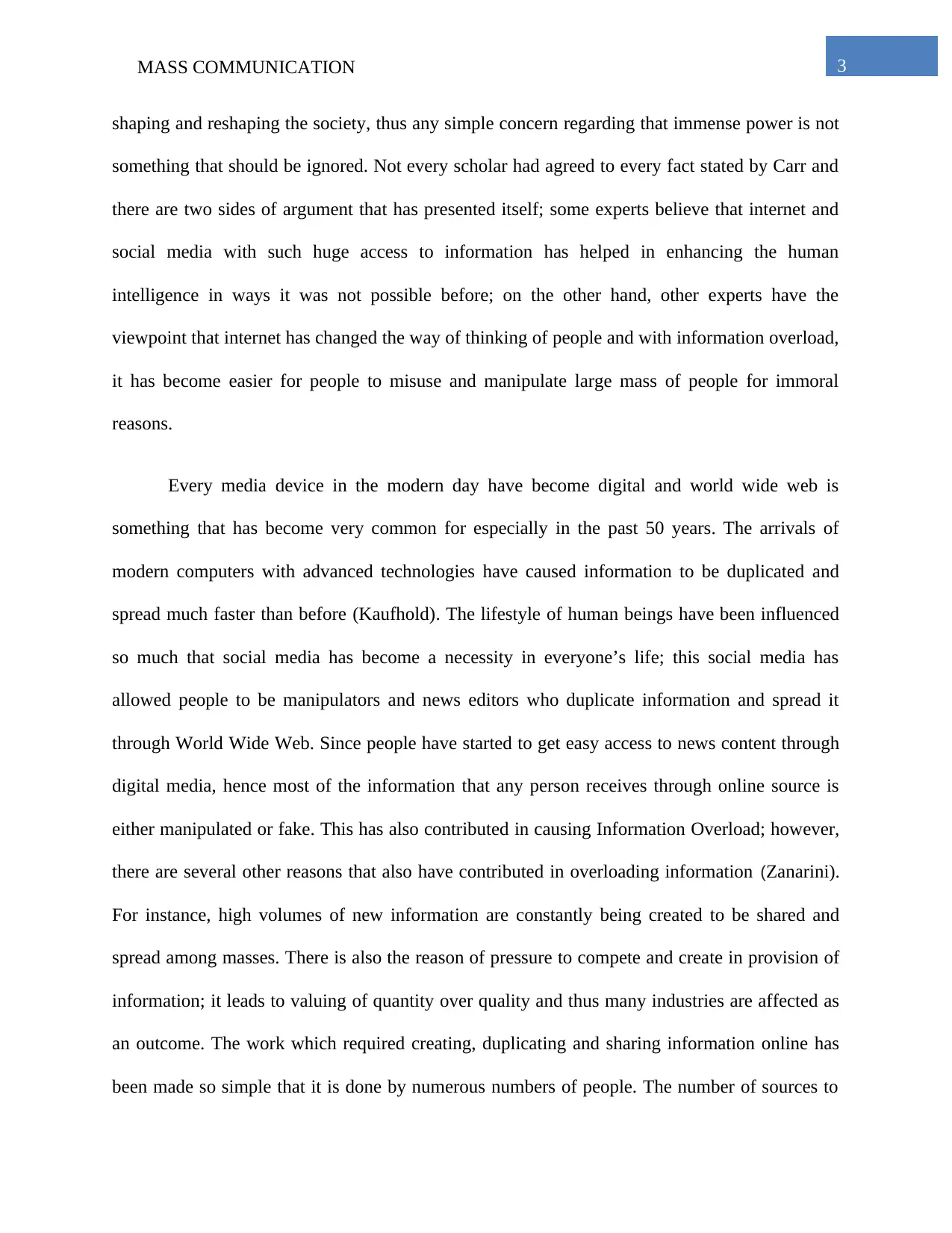
3MASS COMMUNICATION
shaping and reshaping the society, thus any simple concern regarding that immense power is not
something that should be ignored. Not every scholar had agreed to every fact stated by Carr and
there are two sides of argument that has presented itself; some experts believe that internet and
social media with such huge access to information has helped in enhancing the human
intelligence in ways it was not possible before; on the other hand, other experts have the
viewpoint that internet has changed the way of thinking of people and with information overload,
it has become easier for people to misuse and manipulate large mass of people for immoral
reasons.
Every media device in the modern day have become digital and world wide web is
something that has become very common for especially in the past 50 years. The arrivals of
modern computers with advanced technologies have caused information to be duplicated and
spread much faster than before (Kaufhold). The lifestyle of human beings have been influenced
so much that social media has become a necessity in everyone’s life; this social media has
allowed people to be manipulators and news editors who duplicate information and spread it
through World Wide Web. Since people have started to get easy access to news content through
digital media, hence most of the information that any person receives through online source is
either manipulated or fake. This has also contributed in causing Information Overload; however,
there are several other reasons that also have contributed in overloading information (Zanarini).
For instance, high volumes of new information are constantly being created to be shared and
spread among masses. There is also the reason of pressure to compete and create in provision of
information; it leads to valuing of quantity over quality and thus many industries are affected as
an outcome. The work which required creating, duplicating and sharing information online has
been made so simple that it is done by numerous numbers of people. The number of sources to
shaping and reshaping the society, thus any simple concern regarding that immense power is not
something that should be ignored. Not every scholar had agreed to every fact stated by Carr and
there are two sides of argument that has presented itself; some experts believe that internet and
social media with such huge access to information has helped in enhancing the human
intelligence in ways it was not possible before; on the other hand, other experts have the
viewpoint that internet has changed the way of thinking of people and with information overload,
it has become easier for people to misuse and manipulate large mass of people for immoral
reasons.
Every media device in the modern day have become digital and world wide web is
something that has become very common for especially in the past 50 years. The arrivals of
modern computers with advanced technologies have caused information to be duplicated and
spread much faster than before (Kaufhold). The lifestyle of human beings have been influenced
so much that social media has become a necessity in everyone’s life; this social media has
allowed people to be manipulators and news editors who duplicate information and spread it
through World Wide Web. Since people have started to get easy access to news content through
digital media, hence most of the information that any person receives through online source is
either manipulated or fake. This has also contributed in causing Information Overload; however,
there are several other reasons that also have contributed in overloading information (Zanarini).
For instance, high volumes of new information are constantly being created to be shared and
spread among masses. There is also the reason of pressure to compete and create in provision of
information; it leads to valuing of quantity over quality and thus many industries are affected as
an outcome. The work which required creating, duplicating and sharing information online has
been made so simple that it is done by numerous numbers of people. The number of sources to
Paraphrase This Document
Need a fresh take? Get an instant paraphrase of this document with our AI Paraphraser
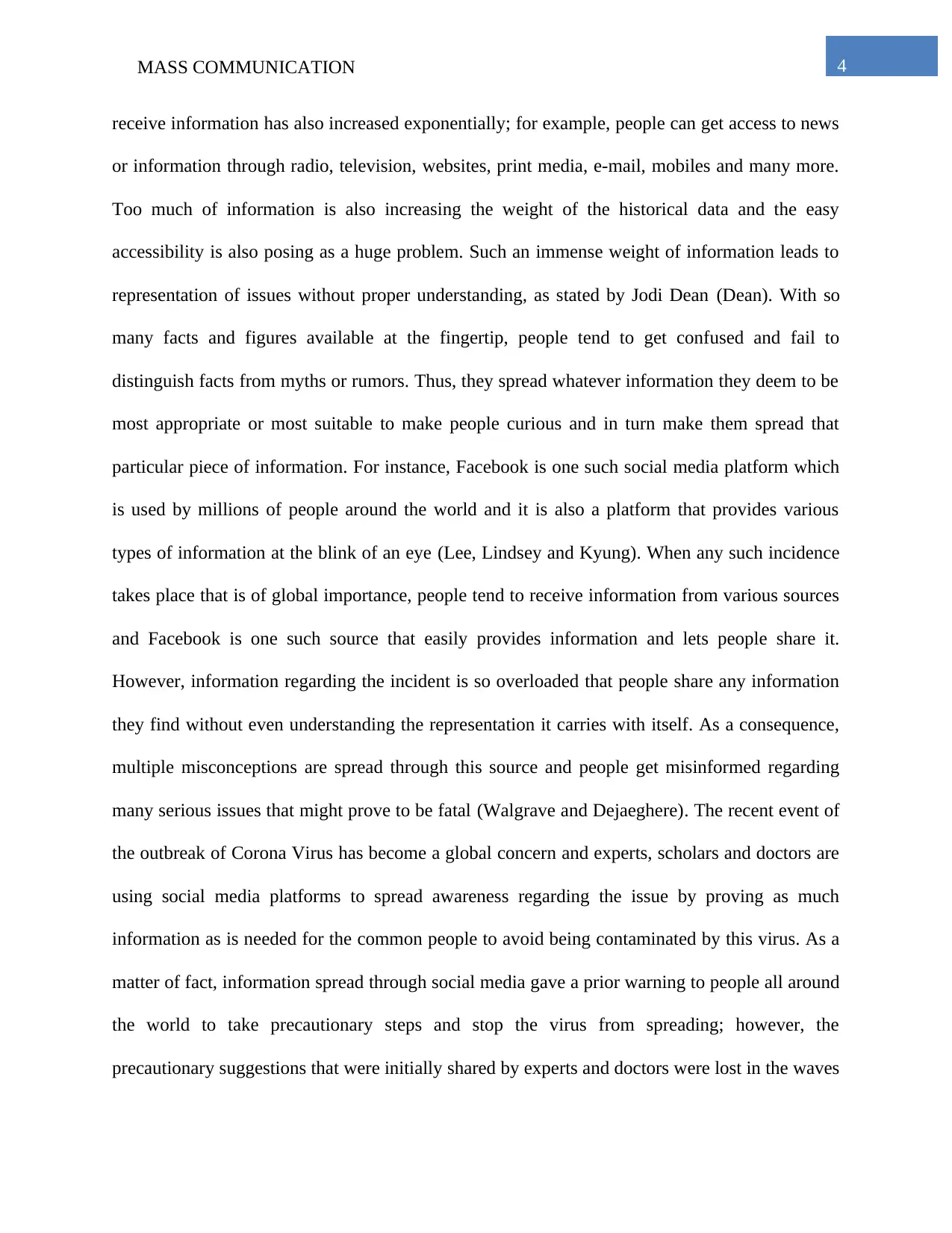
4MASS COMMUNICATION
receive information has also increased exponentially; for example, people can get access to news
or information through radio, television, websites, print media, e-mail, mobiles and many more.
Too much of information is also increasing the weight of the historical data and the easy
accessibility is also posing as a huge problem. Such an immense weight of information leads to
representation of issues without proper understanding, as stated by Jodi Dean (Dean). With so
many facts and figures available at the fingertip, people tend to get confused and fail to
distinguish facts from myths or rumors. Thus, they spread whatever information they deem to be
most appropriate or most suitable to make people curious and in turn make them spread that
particular piece of information. For instance, Facebook is one such social media platform which
is used by millions of people around the world and it is also a platform that provides various
types of information at the blink of an eye (Lee, Lindsey and Kyung). When any such incidence
takes place that is of global importance, people tend to receive information from various sources
and Facebook is one such source that easily provides information and lets people share it.
However, information regarding the incident is so overloaded that people share any information
they find without even understanding the representation it carries with itself. As a consequence,
multiple misconceptions are spread through this source and people get misinformed regarding
many serious issues that might prove to be fatal (Walgrave and Dejaeghere). The recent event of
the outbreak of Corona Virus has become a global concern and experts, scholars and doctors are
using social media platforms to spread awareness regarding the issue by proving as much
information as is needed for the common people to avoid being contaminated by this virus. As a
matter of fact, information spread through social media gave a prior warning to people all around
the world to take precautionary steps and stop the virus from spreading; however, the
precautionary suggestions that were initially shared by experts and doctors were lost in the waves
receive information has also increased exponentially; for example, people can get access to news
or information through radio, television, websites, print media, e-mail, mobiles and many more.
Too much of information is also increasing the weight of the historical data and the easy
accessibility is also posing as a huge problem. Such an immense weight of information leads to
representation of issues without proper understanding, as stated by Jodi Dean (Dean). With so
many facts and figures available at the fingertip, people tend to get confused and fail to
distinguish facts from myths or rumors. Thus, they spread whatever information they deem to be
most appropriate or most suitable to make people curious and in turn make them spread that
particular piece of information. For instance, Facebook is one such social media platform which
is used by millions of people around the world and it is also a platform that provides various
types of information at the blink of an eye (Lee, Lindsey and Kyung). When any such incidence
takes place that is of global importance, people tend to receive information from various sources
and Facebook is one such source that easily provides information and lets people share it.
However, information regarding the incident is so overloaded that people share any information
they find without even understanding the representation it carries with itself. As a consequence,
multiple misconceptions are spread through this source and people get misinformed regarding
many serious issues that might prove to be fatal (Walgrave and Dejaeghere). The recent event of
the outbreak of Corona Virus has become a global concern and experts, scholars and doctors are
using social media platforms to spread awareness regarding the issue by proving as much
information as is needed for the common people to avoid being contaminated by this virus. As a
matter of fact, information spread through social media gave a prior warning to people all around
the world to take precautionary steps and stop the virus from spreading; however, the
precautionary suggestions that were initially shared by experts and doctors were lost in the waves
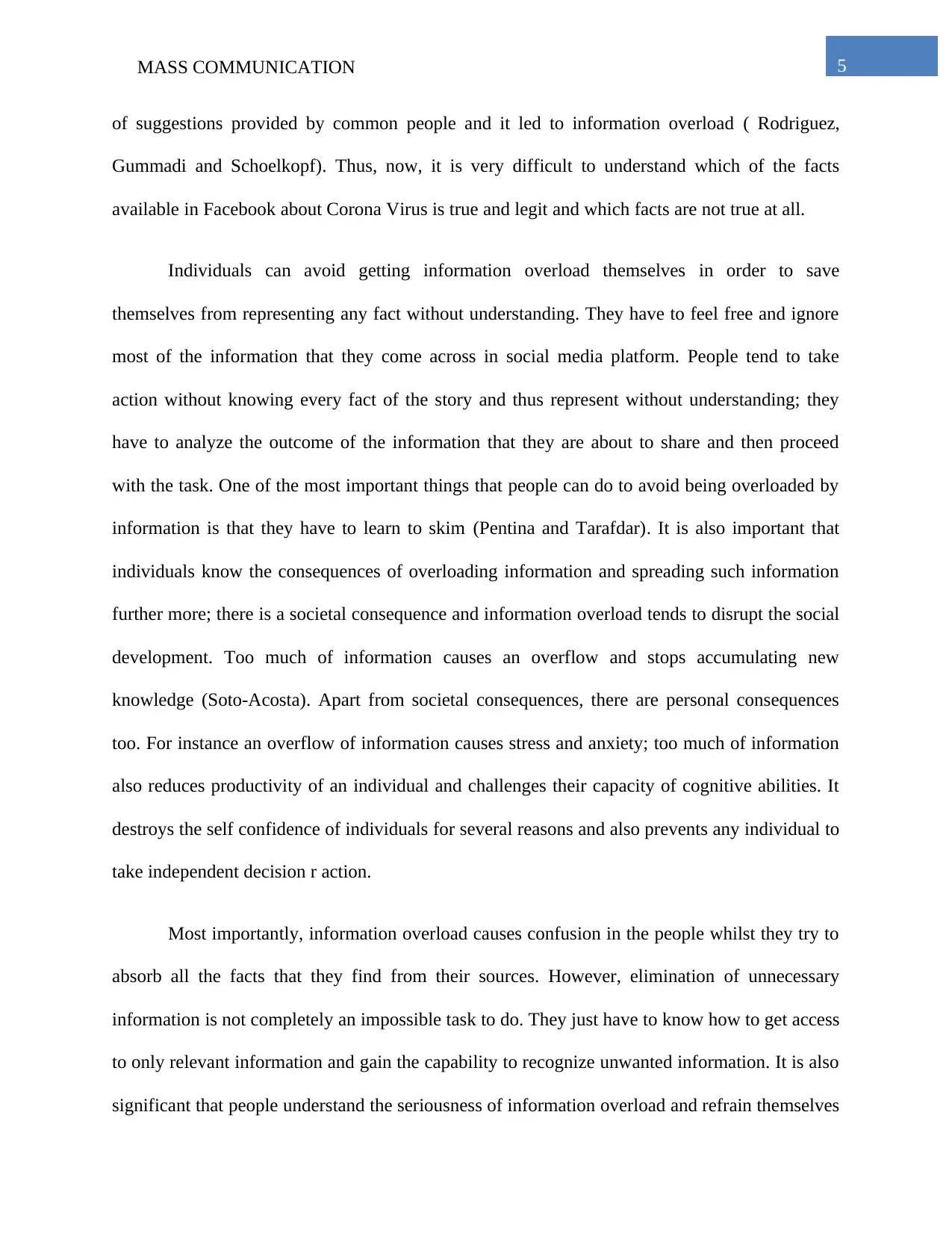
5MASS COMMUNICATION
of suggestions provided by common people and it led to information overload ( Rodriguez,
Gummadi and Schoelkopf). Thus, now, it is very difficult to understand which of the facts
available in Facebook about Corona Virus is true and legit and which facts are not true at all.
Individuals can avoid getting information overload themselves in order to save
themselves from representing any fact without understanding. They have to feel free and ignore
most of the information that they come across in social media platform. People tend to take
action without knowing every fact of the story and thus represent without understanding; they
have to analyze the outcome of the information that they are about to share and then proceed
with the task. One of the most important things that people can do to avoid being overloaded by
information is that they have to learn to skim (Pentina and Tarafdar). It is also important that
individuals know the consequences of overloading information and spreading such information
further more; there is a societal consequence and information overload tends to disrupt the social
development. Too much of information causes an overflow and stops accumulating new
knowledge (Soto-Acosta). Apart from societal consequences, there are personal consequences
too. For instance an overflow of information causes stress and anxiety; too much of information
also reduces productivity of an individual and challenges their capacity of cognitive abilities. It
destroys the self confidence of individuals for several reasons and also prevents any individual to
take independent decision r action.
Most importantly, information overload causes confusion in the people whilst they try to
absorb all the facts that they find from their sources. However, elimination of unnecessary
information is not completely an impossible task to do. They just have to know how to get access
to only relevant information and gain the capability to recognize unwanted information. It is also
significant that people understand the seriousness of information overload and refrain themselves
of suggestions provided by common people and it led to information overload ( Rodriguez,
Gummadi and Schoelkopf). Thus, now, it is very difficult to understand which of the facts
available in Facebook about Corona Virus is true and legit and which facts are not true at all.
Individuals can avoid getting information overload themselves in order to save
themselves from representing any fact without understanding. They have to feel free and ignore
most of the information that they come across in social media platform. People tend to take
action without knowing every fact of the story and thus represent without understanding; they
have to analyze the outcome of the information that they are about to share and then proceed
with the task. One of the most important things that people can do to avoid being overloaded by
information is that they have to learn to skim (Pentina and Tarafdar). It is also important that
individuals know the consequences of overloading information and spreading such information
further more; there is a societal consequence and information overload tends to disrupt the social
development. Too much of information causes an overflow and stops accumulating new
knowledge (Soto-Acosta). Apart from societal consequences, there are personal consequences
too. For instance an overflow of information causes stress and anxiety; too much of information
also reduces productivity of an individual and challenges their capacity of cognitive abilities. It
destroys the self confidence of individuals for several reasons and also prevents any individual to
take independent decision r action.
Most importantly, information overload causes confusion in the people whilst they try to
absorb all the facts that they find from their sources. However, elimination of unnecessary
information is not completely an impossible task to do. They just have to know how to get access
to only relevant information and gain the capability to recognize unwanted information. It is also
significant that people understand the seriousness of information overload and refrain themselves
⊘ This is a preview!⊘
Do you want full access?
Subscribe today to unlock all pages.

Trusted by 1+ million students worldwide
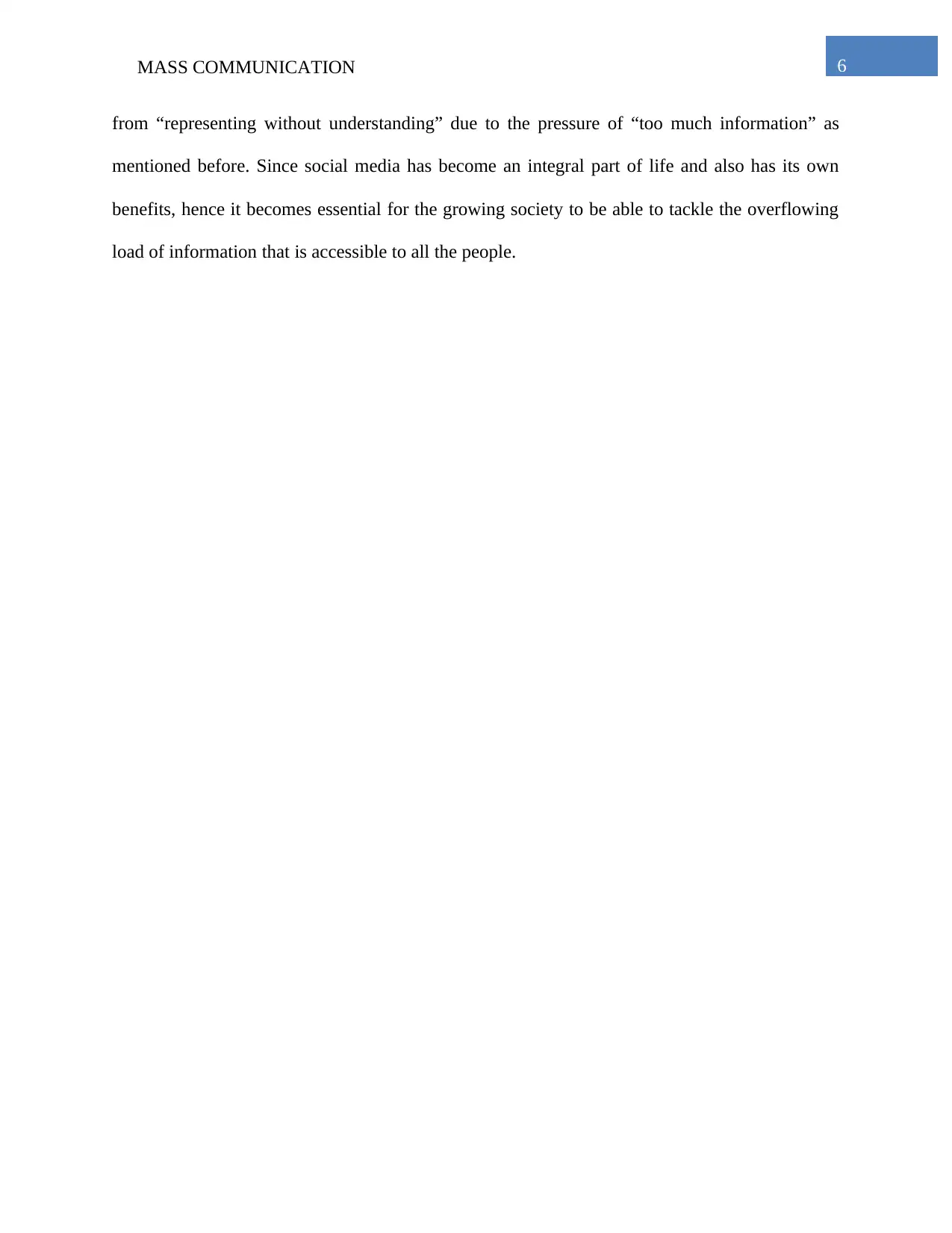
6MASS COMMUNICATION
from “representing without understanding” due to the pressure of “too much information” as
mentioned before. Since social media has become an integral part of life and also has its own
benefits, hence it becomes essential for the growing society to be able to tackle the overflowing
load of information that is accessible to all the people.
from “representing without understanding” due to the pressure of “too much information” as
mentioned before. Since social media has become an integral part of life and also has its own
benefits, hence it becomes essential for the growing society to be able to tackle the overflowing
load of information that is accessible to all the people.
Paraphrase This Document
Need a fresh take? Get an instant paraphrase of this document with our AI Paraphraser
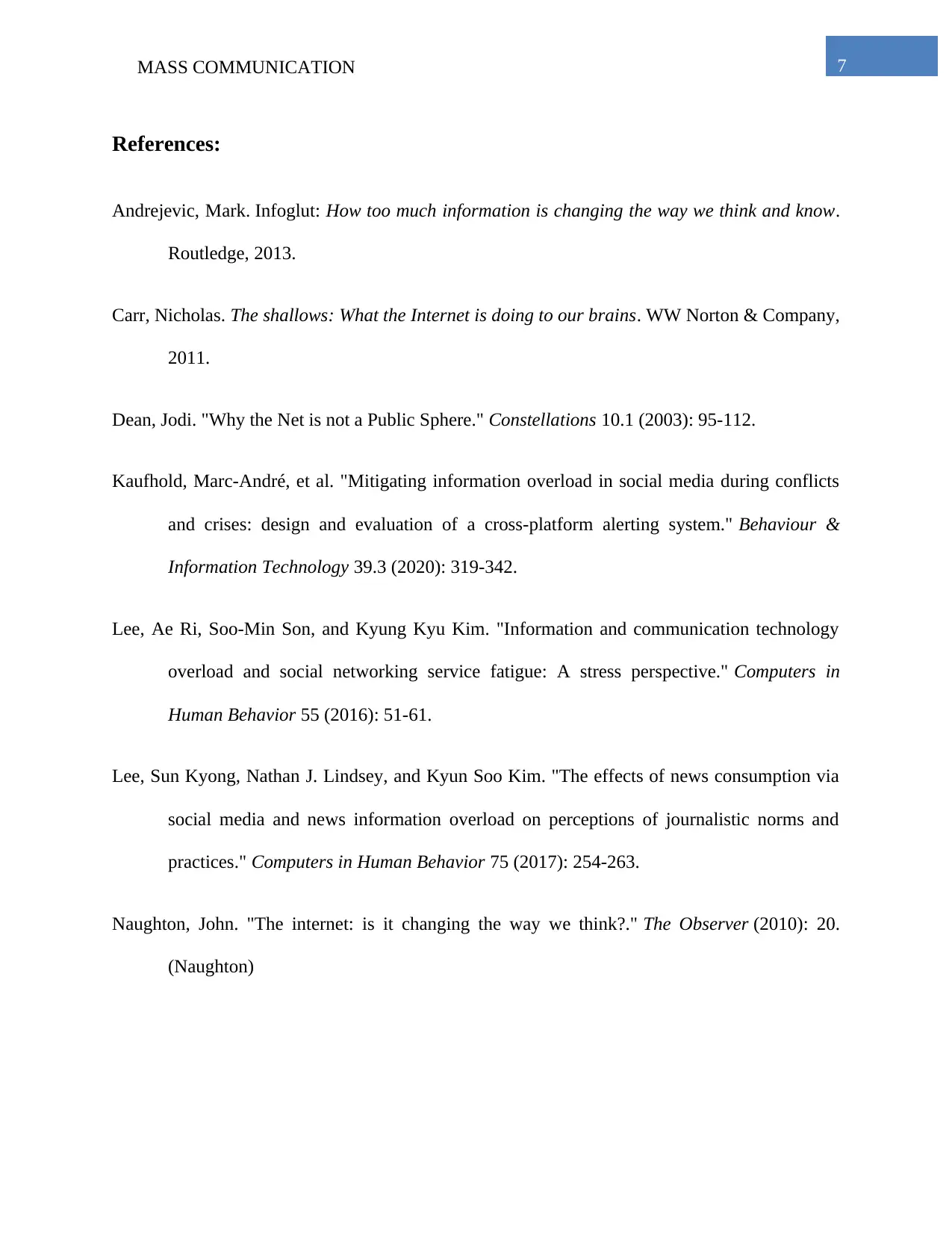
7MASS COMMUNICATION
References:
Andrejevic, Mark. Infoglut: How too much information is changing the way we think and know.
Routledge, 2013.
Carr, Nicholas. The shallows: What the Internet is doing to our brains. WW Norton & Company,
2011.
Dean, Jodi. "Why the Net is not a Public Sphere." Constellations 10.1 (2003): 95-112.
Kaufhold, Marc-André, et al. "Mitigating information overload in social media during conflicts
and crises: design and evaluation of a cross-platform alerting system." Behaviour &
Information Technology 39.3 (2020): 319-342.
Lee, Ae Ri, Soo-Min Son, and Kyung Kyu Kim. "Information and communication technology
overload and social networking service fatigue: A stress perspective." Computers in
Human Behavior 55 (2016): 51-61.
Lee, Sun Kyong, Nathan J. Lindsey, and Kyun Soo Kim. "The effects of news consumption via
social media and news information overload on perceptions of journalistic norms and
practices." Computers in Human Behavior 75 (2017): 254-263.
Naughton, John. "The internet: is it changing the way we think?." The Observer (2010): 20.
(Naughton)
References:
Andrejevic, Mark. Infoglut: How too much information is changing the way we think and know.
Routledge, 2013.
Carr, Nicholas. The shallows: What the Internet is doing to our brains. WW Norton & Company,
2011.
Dean, Jodi. "Why the Net is not a Public Sphere." Constellations 10.1 (2003): 95-112.
Kaufhold, Marc-André, et al. "Mitigating information overload in social media during conflicts
and crises: design and evaluation of a cross-platform alerting system." Behaviour &
Information Technology 39.3 (2020): 319-342.
Lee, Ae Ri, Soo-Min Son, and Kyung Kyu Kim. "Information and communication technology
overload and social networking service fatigue: A stress perspective." Computers in
Human Behavior 55 (2016): 51-61.
Lee, Sun Kyong, Nathan J. Lindsey, and Kyun Soo Kim. "The effects of news consumption via
social media and news information overload on perceptions of journalistic norms and
practices." Computers in Human Behavior 75 (2017): 254-263.
Naughton, John. "The internet: is it changing the way we think?." The Observer (2010): 20.
(Naughton)
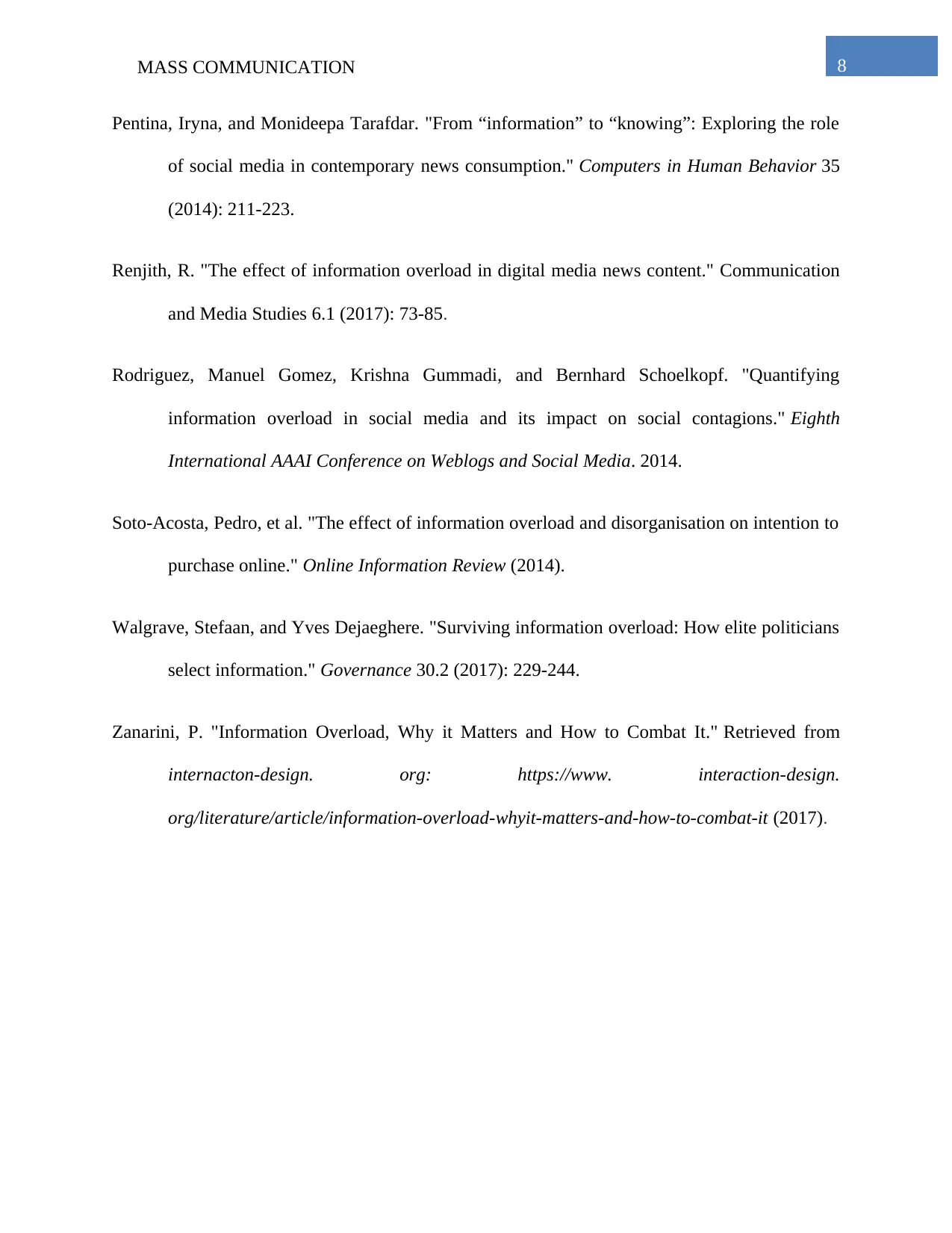
8MASS COMMUNICATION
Pentina, Iryna, and Monideepa Tarafdar. "From “information” to “knowing”: Exploring the role
of social media in contemporary news consumption." Computers in Human Behavior 35
(2014): 211-223.
Renjith, R. "The effect of information overload in digital media news content." Communication
and Media Studies 6.1 (2017): 73-85.
Rodriguez, Manuel Gomez, Krishna Gummadi, and Bernhard Schoelkopf. "Quantifying
information overload in social media and its impact on social contagions." Eighth
International AAAI Conference on Weblogs and Social Media. 2014.
Soto-Acosta, Pedro, et al. "The effect of information overload and disorganisation on intention to
purchase online." Online Information Review (2014).
Walgrave, Stefaan, and Yves Dejaeghere. "Surviving information overload: How elite politicians
select information." Governance 30.2 (2017): 229-244.
Zanarini, P. "Information Overload, Why it Matters and How to Combat It." Retrieved from
internacton-design. org: https://www. interaction-design.
org/literature/article/information-overload-whyit-matters-and-how-to-combat-it (2017).
Pentina, Iryna, and Monideepa Tarafdar. "From “information” to “knowing”: Exploring the role
of social media in contemporary news consumption." Computers in Human Behavior 35
(2014): 211-223.
Renjith, R. "The effect of information overload in digital media news content." Communication
and Media Studies 6.1 (2017): 73-85.
Rodriguez, Manuel Gomez, Krishna Gummadi, and Bernhard Schoelkopf. "Quantifying
information overload in social media and its impact on social contagions." Eighth
International AAAI Conference on Weblogs and Social Media. 2014.
Soto-Acosta, Pedro, et al. "The effect of information overload and disorganisation on intention to
purchase online." Online Information Review (2014).
Walgrave, Stefaan, and Yves Dejaeghere. "Surviving information overload: How elite politicians
select information." Governance 30.2 (2017): 229-244.
Zanarini, P. "Information Overload, Why it Matters and How to Combat It." Retrieved from
internacton-design. org: https://www. interaction-design.
org/literature/article/information-overload-whyit-matters-and-how-to-combat-it (2017).
⊘ This is a preview!⊘
Do you want full access?
Subscribe today to unlock all pages.

Trusted by 1+ million students worldwide
1 out of 9
Related Documents
Your All-in-One AI-Powered Toolkit for Academic Success.
+13062052269
info@desklib.com
Available 24*7 on WhatsApp / Email
![[object Object]](/_next/static/media/star-bottom.7253800d.svg)
Unlock your academic potential
Copyright © 2020–2026 A2Z Services. All Rights Reserved. Developed and managed by ZUCOL.





